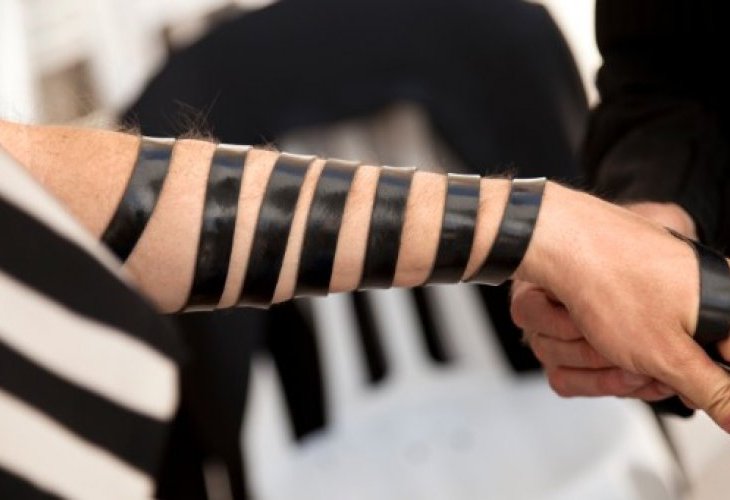Personal Stories
A Grandfather’s Final Wish: Please Put On My Tefillin
A grandfather’s message from the afterlife teaches the timeless value of the mitzvah of tefillin.

It was on the morning of Rosh Hashanah 5778. One of the grandsons of Rabbi Yitzchak Gitelman woke up drenched in sweat. His beloved grandfather, who had passed away 11 years earlier, had appeared to him in a dream. His face was glowing with light, and beside him were his tallit and tefillin, with these words embroidered on the bag: "Please learn Mishnayot for the elevation of my soul."
The grandson was filled with questions. What did Grandfather want? Why was he asking for Mishnayot to be learned for his soul? What was the connection to the tefillin? And why come to him, out of all the grandchildren? Grandfather had so many...
Right after Rosh Hashanah, the grandson told the rest of the family about the dream and tried to make sense of it. In the meantime, he honored his grandfather’s request and began learning a chapter of Mishnayot (short teachings from the Oral Torah) every day for a month, as a merit for his soul. Still, the dream remained a mystery. The whole family even decided to complete the entire Shas (the Talmud) in his memory—but no one could fully understand what the dream meant.
A few months passed. In a casual conversation, one of the other grandchildren told the dreaming grandson that he had their grandfather’s tefillin. Surprised, he asked, “How did you get the tefillin?” The other grandson replied: “Three days before Grandfather passed away, I went to visit him. I suddenly thought, let me help him put on tefillin. Afterwards, he motioned with his hands for me to take them. I told him, ‘There are people who recover from this, maybe you’ll still use them, with Hashem’s help.’ But Grandfather motioned again for me to take them. So I did, and quietly placed them in a corner of the hospital room.”
The grandson continued: “Sadly, Grandfather was right. The next day was Shabbat, when we don’t put on tefillin. On Sunday, he was already unconscious. On Monday, he passed away. And I took the tefillin with me, just as he had asked.”
Then something clicked. The grandson who had the dream suddenly remembered a visit he made to his grandfather in the hospital—four days before he passed away. Grandfather had just woken up after being sedated and on a ventilator for a week. He couldn’t speak, but he motioned toward his head. The grandson thought maybe he wanted his hat, so he handed it to him. But Grandfather waved it away and kept pointing to his head. For some reason, he just couldn’t figure out what his grandfather meant at the time.
And then the full picture became clear.
Grandfather wanted his tefillin.
This dear grandfather, who had been so careful and devoted to the mitzvah of tefillin his entire life, wanted to fulfill it again—even in his final days. His grandson hadn’t understood what he was asking for, and so the mitzvah wasn’t done. The next day, another grandson had the merit of putting tefillin on him one last time.
Now, 11 years after his passing, Grandfather came from the World of Truth to the grandson who had missed the chance. And his request? “Learn Mishnayot for the elevation of my soul.” It was a way to make up for that missed mitzvah.
But the story didn’t end there.
Two months later, during Pesach cleaning, Rabbi Gitelman’s daughter found a bundle of old notes—written by her father during his last illness, when he was ventilated and unable to speak. She remembered seeing the notes back then, but in the stress of caring for her parents, hadn’t understood them.
Now she took a closer look. One note had the word “HaTefillin” written on it. Another had little drawings of tefillin boxes and straps. Even while he couldn’t speak, Grandfather had tried to tell them: “Please, help me put on my tefillin.”
The family approached Rabbi Chaim Kanievsky with this incredible story and asked if there was anything more they could do to make up for not putting tefillin on their father that one final time. The Rabbi answered: “Learn the laws of tefillin from the Mishnah Berurah.” (He gave the same answer once to someone who had forgotten to put on tefillin for one day.)
Rabbi Kanievsky gently explained, "Yes, it's true that the patient was in a situation beyond his control, and in such cases, someone is not required to perform mitzvot. But from Heaven, he was given the chance to return—to remind us all just how precious the mitzvah of tefillin really is."
Courtesy of the 'Dirshu' website.

